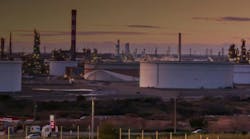Just how bad will the natural gas bust get?
More reports of reduced earnings, slashed budgets, and restructurings crop up in the wake of the lowest North American gas prices in years.
John S. Herold Inc., Greenwich, Conn., expects U.S. gas prices to hit a 12 year low in 1991 and projects a bleaker outlook for Canadian gas prices. Its survey of 137 U.S. gas producers and 59 Canadian producers found 1990 U.S. gas prices rose 1% from 1989 with a weighted average of $1.76/Mcf. Average U.S. gas prices plunged 18% during 1986-90 and 37% during 1985-90.
Herold sees a gradual recovery in 1992 prices and more robust improvement in 1993-95. But the consultant notes Canadian gas prices remain far below U.S. prices, hampered by a huge overhang of surplus capacity. Canadian prices in 1990 fell 29% from 1986 and are likely to worsen this year, says Herold, noting price recovery in Canada is likely to be painfully slow.
The gloomy picture is hitting companies on both sides of the border. Petro-Canada will cut 1991 capital spending 13% to $745 million (Canadian) from $860 million. The state owned company posted a first half loss of $149 million vs. a $29 million profit in first half 1990. Imperial reports a $63 million loss in the second quarter, the first operating loss recorded by Canada's largest integrated oil company, compared with a $238 million profit for the same 1990 quarter in 1990. Shell Canada logged a first half loss of $95 million vs. a profit of $58 million in the same 1990 period--or $219 million if loss on sale of the company's Line Creek open pit coal mine is included.
PanCanadian Petroleum bucked a trend and reported a first half profit of $82.2 million vs. $58 million a year ago, citing increased production and higher average prices stemming from a crude oil hedging program.
In the U.S., although August spot gas prices are up slightly from July's level, they remain as much as 25/MMBTU below year ago levels. And that's squeezing U.S. company operations.
Cabot, reporting a $1.9 million loss in the quarter vs. a small profit a year ago, shut in about 6 MMcfd and cut its budgeted wells for 1991 by a net 30. Coastal cited shut-ins spurred by low prices in reporting a first half slide in gas output to 106.4 MMcfd from 137.5 MMcfd. Pennzoil will restrict sales of about one third of its spot gas volumes until prices rebound.
There is a bright spot for some gas producers: Enron Oil & Gas, while reporting lower second quarter earnings before interest and taxes, posted an increase in net income because of lower interest expense and income taxes--including use of tight gas sands tax credits. Enron has 100 tight gas sands wells producing about 100 MMcfd and expects to bump that up to about 150 MMcfd by yearend. Meantime, Enron curtailed about 30% of its deliverability in the second quarter.
U.S. gas doldrums threaten the slow recovery of the U.S. drilling sector as well.
For the first time, the rig count in the North Sea has eclipsed that in the Gulf of Mexico, where contractors are fleeing in the wake of the gas price plunge. In July's last week, the gulf count fell eight units to 95 vs. a drop of four in the North Sea to 99, reports Oceandril Data Services, Houston.
The Alaska legislature has asked Congress to not allow leasing in Bristol Bay and consider repurchasing leases sold in Sale 92, noting the bay supports commercial fishing with a wholesale value of $1 billion/year and more than 10,000 employees.
The House has delayed until September consideration of a $153.5 billion highway improvements bill that includes a 5/gal increase in the federal gasoline tax to 19/gal. The proposed hike is a major stumbling block to passage, and some congressmen predict it will be deleted. The Senate bill won't increase the gasoline tax and Bush has threatened to veto any bill that does.
API notes state and federal excise taxes represent a sizable share--averaging more than 32/gal--of what U.S. motorists pay for gasoline. Since 1981, combined federal and state gasoline excise taxes have more than doubled, an average combined increase of 17.9/gal. In some areas, motorists are spending more than 40% of motor fuel dollars on taxes.
In a move that could make life a little easier for U.S. refiners with sulfuric acid alkylation units, EPA proposes to delete nonaerosol forms of sulfuric acid from the list of toxic chemicals subject to community right to know provision.
Under the proposed rule, EPA contends the term aerosol covers any airborne generation of sulfuric acid, including mists, vapors, gas, or fog and seeks written comments to Sept. 24.
BP plans to sell $1-2 billion worth of assets in the second half in a move that could affect all company sectors. Talks on some sales are well along. Another $1 billion in asset sales are likely in 1992. BP has realized about $7 billion from its divestment program the past 5 years. Meantime, BP Exploration will transfer management of its southern U.K. North Sea business from Easington to Aberdeen. As many as 40 staff could be moved and 50 laid off. The move will save BP about $5 million/year.
A proposed 120,000 b/d refinery in Pakistan, subject of a joint memorandum of understanding between that country and Iran in May, has a green light, says Iranian Finance Minister Mohsen Nourbakhsh. The $590 million refinery at Qasim, near Karachi, is to be complete by 1996 and will double Pakistan's processing capacity. The two countries still are discussing proposals for a gas pipeline from Iran to Pakistan.
Oil prices continue to remain almost frozen, unfazed by a North Sea platform explosion or the possible prospect of Iraqi exports returning to the market.
Shell Expro shut down its 150,000 b/d Fulmar oil production platform in the U.K. North Sea after three explosions rocked the platform's accommodation unit. Earlier, oil and associated gas production was shut down after a high level gas alert.
Shell said offshore personnel went to muster stations while attempts were made to trace a leak. No leak was found, but 8 min after the all clear was given, the explosions occurred, causing second degree burns to three stewards. All nonessential personnel were evacuated by helicopter.
News of the accident and shutdown had little effect on oil markets. Previous North Sea accidents have demonstrated the volatility of European crude markets.
After the Fulmar accident, trading volumes jumped, but Brent for 15 day delivery slipped 10 to $19.30/bbl. Rotterdam premium prices were unchanged at about $237/ton and gas oil showed little movement at about $180/ton.
The five permanent members of the U.N. Security Council have agreed to allow Iraq to sell as much as $1.5 billion of crude on world markets the next 6 months--about 500,000 b/d.
A third of the money would go to compensate other countries for damages and expenses stemming from Iraq's invasion of Kuwait. The U.N. would use at least half of the revenue to buy and distribute food and medicine for the people of Iraq. The other 10 members of the council will consider the resolution soon but Iraq won't accept it, saying the French proposal would "flagrantly interfere in Iraq's internal affairs."
World oil markets may be blase for the moment, but the specter over the Soviet oil sector continues to haunt the fourth quarter outlook (see story, p. 33). A critical shortage of gasoline in Tadzhik republic has forced the cabinet of ministers to hike prices to a "commercial level" (OGJ, Aug. 5, p. 17). At the official exchange rate, gasoline can be sold for as much as $1.15/1. Tadzhikstan has experienced severe petroleum shortages for 2 years. Ambulances, police vehicles, and commercial trucks have not been provided enough gasoline, and private car owners must wait for days at filling stations to obtain fuel.
Meanwhile, Russian President Boris Yeltsin last week left to tour western Iberia to inspect oil and gas facilities there. Yeltsin's visit comes at a time of growing discontent among Siberian oil workers and plunging production and exports.
Copyright 1991 Oil & Gas Journal. All Rights Reserved.

